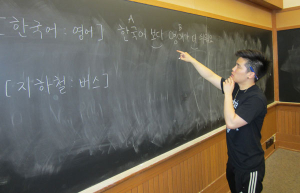Korean History, Literature, Religions, & Cultural Studies
The Korean studies program at Columbia is one of the premier Korean studies programs in the English-speaking world, and offers specializations in Korean History and Korean Literature. Jungwon Kim in pre-modern and early modern Korean cultural history, Theodore Hughes in modern Korean literature and visual culture, and Seong Uk Kim in Korean religions offer a very broad temporal range and rich variety of theoretical and methodological perspectives.

Columbia’s Starr East Asian Library houses one of the largest collections of Korean materials in North America. The Center for Korean Research at the Weatherhead East Asian Institute plays a leading role in the study of Korea within Columbia University, the New York City area, and beyond. By sponsoring public lectures, conferences, workshops, and cultural events such as movies and concerts on Korea-related topics, the CKR works to advance academic knowledge and a greater public awareness of Korea. The CKR also serves as a bridge between Korean Studies in North America and the most recent work of the Korean academic world through its sponsorship of visiting scholars and active partnerships with universities and institutions in Korea.
Our Korean language program is one of the best in North America. We teach first through fifth-year Korean, including a seminar on mixed script designed especially for Korean studies graduate students. Along with Columbia’s nationally leading Chinese and Japanese language programs, the Korean language program in EALAC is a key component of one the top East Asian language programs in North America.
We emphasize an interdisciplinary, transnational approach to Korean studies. Students thus work with a range of faculty at Columbia. In EALAC, we have great depth on the Japan side, with Carol Gluck, Paul Kreitman, Gregory Pflugfelder, and David Lurie in history, Tomi Suzuki, and Haruo Shirane in literature, and Paul Anderer in Japanese film and visual culture. Our strong Chinese studies program features Madeleine Zelin in modern economic and institutional history, Eugenia Lean in modern cultural history, Dorothy Ko in Ming-Qing cultural history and material history, and Li Feng in early history and archaeology We are just as rich in Chinese literature, with Lydia Liu in modern literature and theory and Shang Wei in Ming-Qing fiction and drama. We have the leading faculty in East Asian religion in this country with Bernard Faure, Max Moerman, and Michael Como in Japanese religions.
Columbia’s location in New York City, home to the second-largest Korean-American community in the United States, provides students with a wealth of Korea-related academic and cultural activities. Students can take advantage of Korea-related talks, film screenings, exhibitions, and other activities at The Korea Society, Asia Society, Lincoln Center, Metropolitan Museum of Art, Museum of Modern Art, and New York Public Library.
Students in the PhD program at Columbia engage in cutting-edge research on a wide array of topics. Please see the list of recent graduates and their dissertation topics as well as the current PhD student profiles. The PhD program provides full funding (covering both tuition and stipend) for five years. The Korean studies MA program has a very strong record of placing its graduates in PhD programs of high quality or in non-academic jobs related to East Asia; it is a good beginning to either an academic or a professional career. Please contact Korean studies faculty by email to learn more about the PhD and MA programs.

